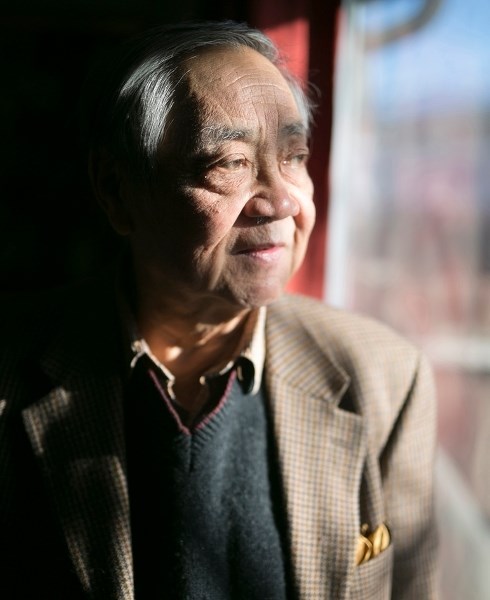INNISFAIL – The town has lost its prince. His Royal Highness Prince Hso Khan Pha, a member of the royal family of the Shan State of Yawnghwe in Myanmar -- formerly known as Burma -- died peacefully at his Innisfail home on Oct. 2. He was 78.
INNISFAIL – The town has lost its prince.
His Royal Highness Prince Hso Khan Pha, a member of the royal family of the Shan State of Yawnghwe in Myanmar -- formerly known as Burma -- died peacefully at his Innisfail home on Oct. 2. He was 78.
Known as "Tiger" to his many friends and colleagues around the world, the prince dedicated his life to securing his state's full independence from Myanmar, which since a military coup in 1962 has been ruled by the heavy hand of a military junta. Governing more than 100 ethnic groups, the junta has been consistently condemned across the world for human rights abuses and ignoring widespread impoverishment of its more than 51 million citizens.
"Many times they said how passionate he was, right up to last week, talking about the projects he was working on and the work he was trying to do for the Shan State to help our fellow people there," said the prince's youngest son Kham Serk Yawnghwe, a professional musician from Edmonton who has three other grieving siblings. "Everybody I talked to has said how kind he was, what a good man he was, and he loved his family."
Tiger's journey to Canada from his native Shan State was both a tragedy and one of determined persistence to secure the full rights of his people.
His father, Sao Shwe Thaik, the last Saopha – or king of Yawnghwe, became the first president of the Union of Burma. He was forcibly removed from office in March 1962 during the military coup. He died the following November while being imprisoned, a death Tiger called "murder."
Tiger was in university in England at the time of the military coup, which also claimed the life of a younger brother, and forcibly scattered the rest of his family. For the next half century he was exiled but continued his life as a geologist in Canada, and a passionate and hard-working advocate to have his native home freed from the military dictatorship.
"He was constantly communicating, consulting and advocating and spreading his ideas and beliefs in the right for the Shan State to be an independent nation," said Kham. "He had a wide network of friends he kept in touch for his entire life. A regular part of his life was staying informed and informing people and staying connected with people within his network from all over Canada, his school friends, professional colleagues in geology and other ethnic leaders from Burma who are going through the same struggle."
Tiger came to Innisfail in 2000, where he continued to work as a geological consultant in the mining and oil and gas industries. He lived quietly in town but did make friends and was often seen having lunch at the Innisfail Royal Canadian Legion.
"Personally, I am saddened that a well-liked member of this branch has suddenly passed away. Tiger was distinctive and unique, more so than a significant number of our members, many of whom themselves have very distinct backgrounds and interesting life stories," said Arno Glover, manager of the legion. "We have lost a distinguished, warm and sincere friend."
Although his time in Innisfail was more often than not understated, his lifelong passion to have his homeland become independent never subsided, a fact that was always noted by fellow exiles.
In 2005, Shan State exiles and sympathizers proclaimed him Head of State and President of the Federated Shan States.
During his interview with the Province earlier this year, he condemned the proclamation from the government of Myanmar that it had sworn in its first democratically elected parliament in more than a half century.
"They (military) still hold 25 per cent of the seats but they might as well have 100 per cent. It really doesn't matter. It is still a military dictatorship," said Tiger, who insisted then that the fight to bring true democracy and independence for the Shan State would go on long after his battle came to an end.
"If my people get the funding we will continue fighting, even after 200 years, yes, or 300 years or 1,000 years. I don't have to try to keep the cause alive. The cause keeps itself alive. It may never be in my lifetime, but history changes."
Tiger's life and fight is over, but his son said his father's cause would not be forgotten.
"His knowledge was so deep and vast from his years of experience and it would be hard to just step in and pick up his work," conceded Kham. "But I think it will be something that will be on our minds."
Tiger's remains were cremated in Innisfail. A memorial service was held for him on Oct. 16 in Edmonton.
Kham Serk Yawnghwe, youngest son.
"He was constantly communicating, consulting and advocating and spreading his ideas and belief in the right for the Shan State to be an independent nation."
